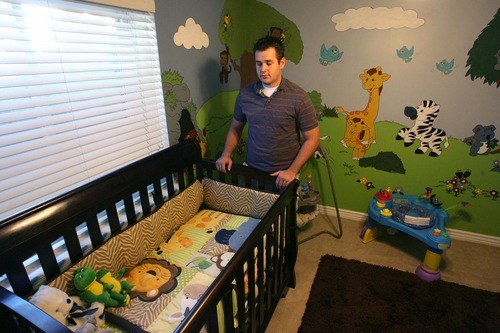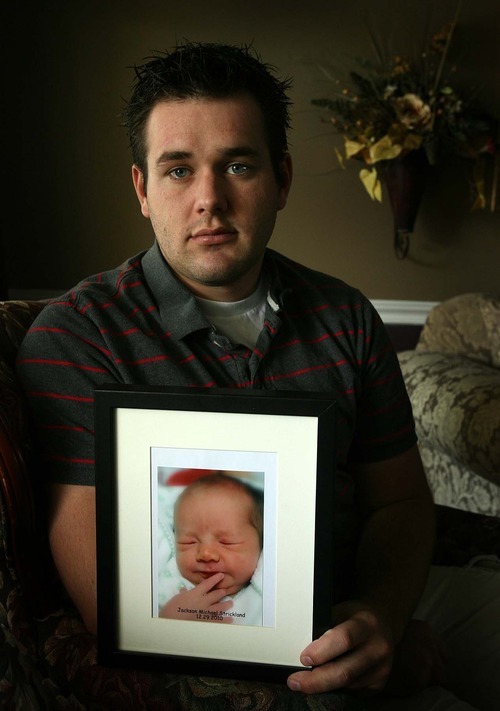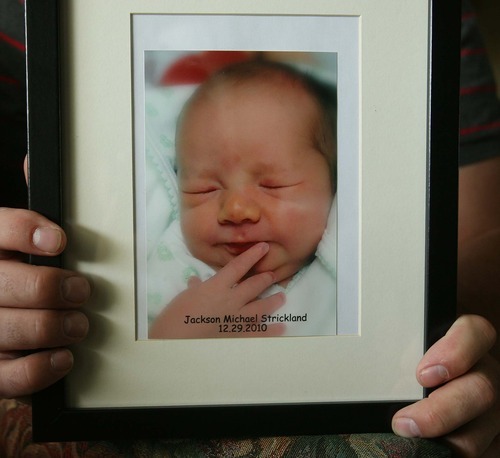This is an archived article that was published on sltrib.com in 2011, and information in the article may be outdated. It is provided only for personal research purposes and may not be reprinted.
As they toured the holiday lights at Temple Square last December, Jake Strickland and Whitney Pettersson looked like just another happy, expectant couple.
Their baby was due in less than two weeks, and although not married or even in a relationship any longer, they'd decided to raise the child together. Or so Strickland thought.
A year later, Strickland is embroiled in a desperate, and so far unsuccessful, legal battle to gain custody of his child, born just a day after that visit to Temple Square and swiftly placed with adoptive parents. Strickland is among dozens of men who've waged similar fights in Utah, which arguably has the nation's strictest laws governing unwed father's rights.
Among several miscalculations on Strickland's part, he admits this may have been the biggest one: He trusted Pettersson.
Read other parts of this series:
Dec. 25: Stopping an adoption: In Utah, fathers rarely win • http://bit.ly/uT51Tc
Dec. 26: Utah adoption law: model for nation or unjust burden? • http://bit.ly/vFuYQ8
The two met in 2009 at a South Jordan restaurant where they both worked. Pettersson openly discussed her rocky marriage and then announced she had divorced, said Strickland, 24. They began dating last January. Three months later, Pettersson sent Strickland a text message: "I'm pregnant."
Pettersson, who also has a daughter, was distraught, Strickland said, but he reassured her they'd figure it out together.
Two weeks later, Strickland left for a temporary job in Texas, where he hoped to make enough money to pay off debt and build up a baby fund. During the months he was away, Pettersson twice tried to end the relationship, expressing doubt he'd stick around. Strickland says he constantly reassured her of his intention to be a dad. Meanwhile, she built ties with his family, attending a baby shower and a birthday party.
But the pair's relationship had run its course by August, when Strickland returned to Utah. Even so, the two continued to meet for lunch several times a week. It was at one of those meetings that Strickland pressed Pettersson about where she stood on adoption and mentioned he might sign with Utah's putative father registry.
Pettersson became furious and threatened to not let him see his baby, he said, and "told me straight up I didn't need to and it would be a waste of money, and I stupidly believed her."
Strickland was reluctant to spend nearly $3,500 to hire an attorney to handle filings when there was a baby on the way. So he did nothing legally to protect his parental rights.
Attorney David J. Hardy, who represents Pettersson, declined a request seeking comment for this story. But in remarks not specifically about the Strickland case, attorney David M. McConkie explained Utah's law puts the onus on fathers to protect their own rights. In fact, Utah law says fraud on the mother's part does not excuse a father's failure to protect himself, said McConkie, who helped draft the law.
"Don't expect the mother to be the one that's looking after your interests, to protect your interests, because you've got to know that mother may not have the same interests that you do," said McConkie, who formerly worked with Hardy but now is a manager at LDS Family Services. "You don't have a legal relationship here. You proceed at your risk."
As summer wore on, Strickland said he bought groceries and gave cash to Pettersson, who wasn't working. He accompanied Pettersson to doctor's visits, although he nearly always stayed in the waiting room with her daughter. The one exception: August 30, the day an ultrasound revealed the baby's gender: It was a boy.
Strickland felt reassured adoption was out as their discussions turned to baby names and how they'd share parenting.
In October, he gave Pettersson a cashier's check for nearly $1,000 to cover medical bills. But Strickland said Pettersson put him off when he attempted to accompany her to the last round of doctor visits, claiming she'd already gone or an appointment had been canceled.
In mid-December, Strickland and Pettersson attended a family Christmas party together, then a baby shower Strickland's older brother hosted for him. A photo taken afterward shows Strickland and Pettersson cuddling on a couch. They went to a movie on Dec. 27. On Dec. 28, after touring Temple Square, Strickland took Pettersson to meet his grandmother and some cousins. Early the next afternoon, Dec. 29, the two exchanged text messages and Strickland asked how Pettersson was feeling.
"Good," she texted back, using a smiley face emoticon for emphasis. And then she wrote that having sex might help make the baby come sooner.
"LOL, well, that was blunt," Strickland wrote back.
"Yeah, well, I kept dropping hints every time we hang out, but you are so dumb to them so I thought I would just say it," she responded, using a smiley face again.
"No I heard you, but I don't think that would turn out well in the end," Strickland wrote, apologizing.
His next text message was sent at 2:18 p.m. that afternoon.
"What are you up to?" he asked.
Pettersson didn't respond. Hours later, she gave birth.
She signed relinquishment papers at 9:45 p.m. on Dec. 30, according to a court filing. Pettersson listed the time of the baby's birth as 9:18 p.m. on Dec. 29; she'd gone over Utah's 24-hour waiting period by 27 minutes.
In the same document, Pettersson affirmed the child was born within a marriage. Contrary to what Strickland said she'd told him, Pettersson and her husband had separated but never divorced. And under Utah law, a married woman's husband is presumed to be the father of her child, regardless of whether that's factual.
"What the law does is it recognizes marriage as a sacred institution, and the law says if a child is born within a marriage, we don't care who the father of the child is biologically because we are not going to take a child that was born in a marriage and make the child illegitimate except under extreme circumstances," McConkie said.
When a married woman pursues adoption, her husband must sign relinquishment papers, too, though he can check an option denying paternity. That's what Kyle Rathjen, Pettersson's then-estranged husband, chose to do.
"I asked what would happen if I didn't sign and the caseworker said I'd be responsible for the child, for Whitney's medical bills," Rathjen said. When he objected to the way Strickland was being misled, a caseworker told him to "stay out of it," said Rathjen, now divorced from Pettersson. "I wasn't supposed to tell him anything."
But Rathjen's conscience bothered him and he sent Strickland copies of the signed papers. Pettersson claimed they'd been forged and, once again, Strickland believed her.
In the days after the baby's birth, the charade was still on. In text messages Strickland sent to Pettersson between Dec. 30 and Jan. 5, 2011, he continued to ask how she was feeling and about her doctor's visits. He got the same response each time.
"Good no change," she wrote on Jan. 3.
"Good still all set for the 12th at 7:30 a.m. right? I can't wait any more!" replied Strickland, who'd been told the baby would be delivered by C-section on that day.
"Yep," Pettersson replied.
Finally, on the evening of Jan. 5, Pettersson sent Strickland a text saying she needed to talk to him.
Strickland said Pettersson began that phone call by saying she had some news and he wasn't going to like it. She informed Strickland she'd given birth on Dec. 29 and placed the baby with an adoptive couple a day later. Strickland said he was so shocked he sank to the floor.
The next day, Strickland initiated a paternity claim.
During a hearing in May, Cory Wall, Strickland's attorney, laid out Pettersson's numerous deceptions. Hardy argued Strickland failed to protect his rights under Utah law and, because the child was born to a married mother, lacked standing to bring a paternity action. He also disputed Strickland's assertion that Pettersson assured him they would parent together.
"Such assertions, however, have no bearing on this matter," Hardy wrote. "Based on the cited statute, petitioner is presumed to know that Ms. Pettersson might place the child for adoption despite earlier intentions to the contrary."
But 3rd District Judge Terry Christiansen refused to dismiss Strickland's petition, calling the situation a "very troubling case."
"Assuming the text messages are accurate, there is a deliberate attempt by Ms. Pettersson to deceive Mr. Strickland as it relates to the birth of this child," the judge said. "There were obvious fraud and misrepresentations occurring."
But, after noting Utah's strict requirements, the judge said, "No matter what I do, I'm either sanctioning a fraud toward Mr. Strickland or I'm depriving adoptive parents of a child I'm sure they've grown to love and appreciate."
Because the adoptive parents had initiated an adoption proceeding in 2nd District Court, Christiansen asked attorneys — in May and again at a later hearing — to consolidate the cases and figure out which judge should hear them. He put the paternity action on hold.
But nothing happened, and Strickland said he's unsure why. Strickland admitted in early November he was wearing down. His life was on hold "until I know if I'm going to get my son back," he said. "I know my chances of winning are slim to none, if they exist at all. They are getting what they want, running me out of money, emotionally."
On Thanksgiving Day, Strickland and his family learned the adoption had been completed, leaving them bewildered, devastated and contemplating their next move.
"These are small children who are going to grow up to be adults and ask, 'Why wasn't I kept with my dad who loved me?'" said Jenny Graham, Strickland's mother. "Jake is the one who has to look at him in 18 years and say, 'I wanted you more than anything.' We're taking from and destroying one family to create another."
brooke@sltrib.com —
Editor's note
This is the third of four stories examining adoption in the context of unmarried fathers' rights under Utah law. —
Taking it public
Each of these fathers has created websites to publicize their cases and raise awareness about Utah's putative father laws, which you can find here:
Jake Strickland • www.getbabyjackback.com
Cody O'Dea • www.babyselling.com
Robert Manzanares • www.illegaladoption.com









